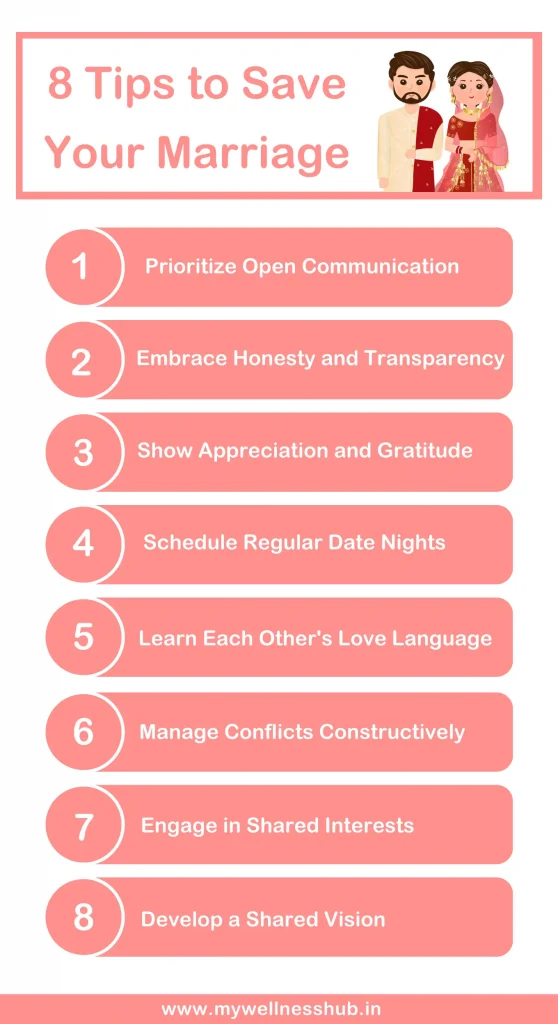How to Save Your Marriage: 8 Tips from Therapists
By Wellness Hub
Last Updated: June 29, 2024
Marriage is amazing, but life can get messy. Between work, kids, and everything else, it’s easy to fight with your partner. Don’t worry, this is normal! But if you don’t address these issues, things can snowball. This article will give you 10 expert tips to overcome challenges and bring back the love!

1. Prioritize Open and Consistent Communication
Importance of Communication in a Healthy Marriage
Communication is key to a healthy marriage. It’s what keeps a relationship strong, allowing partners to share their feelings, thoughts, and solve problems together. Without good communication, misunderstandings and resentment can grow, leading to distance and conflict.
Tips for Open and Honest Conversations
Set Aside Quality Time
Find specific times to talk without distractions, like during a walk, over dinner, or before bed. Being fully present makes conversations more meaningful.
Practice Active Listening
Listening is as important as speaking. Show you value your partner’s thoughts by giving full attention. Nod, make eye contact, and avoid interrupting. Repeat back what you’ve heard to show understanding.
Be Honest and Clear
Share your thoughts and feelings openly. Avoid hiding emotions or sugar-coating concerns. Honesty builds trust and helps your partner understand you better.
Use “I” Statements
Use “I” statements to express your feelings without blaming. For example, say “I feel upset when…” instead of “You always…”. This helps prevent defensiveness and keeps the focus on your feelings.
Stay Calm and Respectful
During disagreements, stay calm and respectful. Take deep breaths, and if things get too heated, take a break and revisit the conversation later. Respect ensures both partners feel safe to express themselves.
Ask Open-Ended Questions
Encourage deeper conversations by asking open-ended questions. Instead of “Did you have a good day?” ask “What was the best part of your day?”. This invites your partner to share more.
Validate Each Other’s Feelings
Acknowledge your partner’s emotions, even if you don’t agree. Validation shows you respect their perspective and their feelings matter to you. Simple phrases like “I understand why you feel that way” can go a long way.
Be Consistent
Make communication a regular part of your relationship, not just when there’s a problem. Regular check-ins help maintain a strong connection and prevent small issues from becoming big problems.
Comparison of Communication Techniques
| Technique | Description |
|---|---|
| Active Listening | Paying full attention to what your partner is saying, showing interest, and responding thoughtfully. This involves making eye contact, nodding, and reflecting back what you heard to ensure understanding. It helps in making your partner feel valued and understood. |
| “I” Statements | Expressing your feelings and thoughts without blaming your partner. Instead of saying “You always ignore me,” you would say “I feel ignored when you don’t respond.” This approach reduces defensiveness and opens up a constructive dialogue. |
| Open-Ended Questions | Asking questions that cannot be answered with a simple “yes” or “no.” These questions encourage your partner to share more about their thoughts and feelings. For example, “How did that make you feel?” or “What are your thoughts on this?” This technique promotes deeper understanding and connection. |
| Validation | Acknowledging and affirming your partner’s feelings and experiences. This does not mean you have to agree with them, but it shows that you recognize their emotions as valid. For example, saying “I understand why you feel that way” can make your partner feel supported and respected. |
Also read: Better ways to communicate in relationships
2. Embrace Honesty and Transparency
Building Trust Through Honesty
Honesty is crucial for trust in a marriage. Being truthful means sharing your thoughts, feelings, and experiences without hiding or distorting the truth. When you are honest, your partner can trust your words and actions, which builds a strong sense of security.
Even small lies can damage this trust over time. Once trust is broken, it can be hard to rebuild. It’s important to prioritize honesty in your relationship. This doesn’t mean sharing every minor detail but being truthful about significant matters that affect your relationship and your partner’s well-being.
Encouraging Openness Between Partners
Openness and honesty go hand-in-hand. Openness involves sharing your innermost thoughts and feelings and encouraging your partner to do the same. This fosters a deeper emotional connection.
Tips to Encourage Openness
- Create a Safe Space for Sharing
- Make your partner feel safe to express their true feelings without fear of judgment or criticism. Show empathy and support when they share something personal.
- Be Vulnerable
- Don’t be afraid to show your vulnerabilities. Sharing your fears, insecurities, and mistakes can bring you closer. It shows that you trust your partner with your true self.
- Ask Open-Ended Questions
- Encourage your partner to share more by asking questions that require more than a yes or no answer. Questions like “How did that make you feel?” or “What do you think about this?” can lead to deeper conversations.
- Listen Without Interrupting
- Give your partner the floor when they’re speaking. Listen attentively and avoid interrupting. This shows respect and allows them to fully express their thoughts.
- Express Appreciation for Openness
- When your partner opens up, express your gratitude. Let them know that you appreciate their honesty and the trust they’re placing in you.
- Share Positive and Negative Feelings
- Openness isn’t just about sharing problems. Share your positive feelings and experiences too. Celebrate your successes and happy moments together.
- Be Consistent
- Make openness a regular part of your relationship. The more you practice sharing and listening, the more natural and comfortable it will become.
Read more: Understanding and Managing Jealousy in Relationships
3. Show Appreciation and Gratitude
Avoiding Taking Your Partner for Granted
In the hustle and bustle of daily life, it’s easy to start taking your partner for granted. Over time, the little things they do might become expected, and their efforts might go unnoticed. This can lead to feelings of underappreciation and resentment, which can strain the relationship.
Expressing Gratitude and Appreciation Regularly
Regularly expressing gratitude and appreciation can greatly improve your relationship. It creates a positive atmosphere and encourages your partner to keep contributing positively. Here are some simple ways to show appreciation:
Say “Thank You” Often
Make it a habit to thank your partner for the little things they do every day. A simple “thank you” can make them feel valued.
Write Notes or Letters
Leave a note for your partner expressing your appreciation. It could be a sticky note on the fridge or a heartfelt letter in their bag. Written words can have a lasting impact.
Give Compliments
Compliment your partner on their qualities, achievements, and efforts. Genuine compliments can boost their self-esteem and reinforce positive behavior.
Plan Surprise Gestures
Surprise your partner with small acts of kindness, like their favorite treat, a planned date night, or a small gift. These gestures show that you think of them and appreciate their presence in your life.
Acknowledge Their Efforts Publicly
Sometimes, acknowledging your partner’s efforts in front of friends or family can make them feel extra special. It shows that you’re proud of them and value their contributions.
Spend Quality Time Together
One of the best ways to show appreciation is by spending quality time with your partner. Engage in activities they enjoy and be fully present during these moments.
Express Gratitude for Their Support
Thank your partner for their emotional support, especially during tough times. Let them know how much their support means to you and how it helps you cope better.
Celebrate Milestones and Achievements
Celebrate your partner’s achievements and the milestones in your relationship. Whether it’s a work promotion or an anniversary, acknowledging these moments strengthens your bond.
4. Schedule Regular Date Nights
Importance of Maintaining Romance
Maintaining romance is crucial for keeping the spark alive in any marriage. Over time, the initial excitement of a relationship can fade as daily routines and responsibilities take over. However, regularly scheduled date nights can help you reconnect with your partner, reminding you both of the love and attraction that brought you together in the first place.
Date nights offer a break from the monotony of everyday life and provide an opportunity to focus solely on each other. They help reinforce your bond, improve communication, and strengthen your emotional connection. By prioritizing time for just the two of you, you can keep your relationship fresh and exciting, fostering a deeper sense of intimacy and closeness.
Ideas for Date Nights and Shared Activities
Strengthen Your Bond: Shared Activities
- Dinner and a Movie
- Recreate the classic date night by going out for dinner at a restaurant you both love, followed by a movie. Alternatively, you can cook a special meal together at home and watch a favorite film.
- Outdoor Adventures
- Spend time in nature by going for a hike, bike ride, or a picnic in the park. These activities not only allow you to enjoy each other’s company but also promote physical well-being.
- Game Night
- Set up a game night with board games, card games, or video games. This can be a fun and light-hearted way to engage with each other and enjoy some friendly competition.
- Cooking Class
- Take a cooking class together to learn how to prepare a new dish. This can be a fun and interactive way to bond, and you get to enjoy a delicious meal at the end.
- Visit a Museum or Art Gallery
- Spend an afternoon exploring a museum or art gallery. This can spark interesting conversations and allow you to share your thoughts and perspectives on different exhibits.
- Spa Night
- Create a relaxing spa experience at home. Light some candles, play soothing music, and give each other massages. This can be a great way to unwind and show affection.
- Concert or Live Event
- Attend a concert, theater performance, or sports event that you both enjoy. Experiencing live entertainment together can be thrilling and memorable.
- Plan a Weekend Getaway
- If possible, plan a short trip to a nearby destination. A change of scenery can be refreshing and provide a perfect setting for quality time together.
- Stargazing
- On a clear night, find a quiet spot away from city lights and spend some time stargazing. Bring a blanket and some snacks, and enjoy the beauty of the night sky together.
- Volunteer Together
- Find a cause you both care about and spend time volunteering. Helping others can bring you closer and give you a sense of shared purpose.
5. Learn Each Other’s Love Language

Understanding Different Love Languages
Every person has a unique way of showing and receiving love. Understanding these love languages can greatly improve your relationship. Dr. Gary Chapman introduced the idea of the five love languages in his book “The 5 Love Languages.” These are:
Words of Affirmation
Expressing love through spoken words, praise, or appreciation. Simple phrases like “I love you” or “You mean so much to me” can be very powerful.
Acts of Service
For some, actions speak louder than words. Doing things like cooking a meal, running errands, or helping with chores shows you care.
Receiving Gifts
Gift-giving is a symbol of love and thoughtfulness. It’s not about the cost but the thought behind the gift. It could be a favorite snack or a handmade card.
Quality Time
Giving your undivided attention to your partner. Spending time together, having meaningful conversations, or enjoying activities together are important.
Physical Touch
Physical touch is a strong emotional connector. Holding hands, hugging, kissing, or other forms of physical affection convey deep love and care.
Tips for Expressing Love in Your Partner’s Preferred Way
- Identify Your Partner’s Love Language Notice how your partner shows love to you and ask them what makes them feel most loved. Knowing their primary love language is the first step.
- Use Words of Affirmation If your partner values words of affirmation, make it a habit to give compliments, express your love verbally, and write notes or letters highlighting their strengths.
- Perform Acts of Service For partners who appreciate acts of service, help with tasks or chores they find stressful. Take the initiative to assist without being asked.
- Give Thoughtful Gifts When giving gifts, focus on the thought behind the gift rather than its price. Consider what your partner enjoys or has mentioned wanting.
- Spend Quality Time Together If quality time is your partner’s love language, prioritize spending time together without distractions. Plan activities you both enjoy and have regular date nights.
- Show Physical Affection For those who value physical touch, include more physical closeness in your daily routine. Hold hands, give hugs, or sit close to each other.
- Communicate Your Own Love Language Share your own love language with your partner so they know how to make you feel loved. Understanding each other’s preferences can strengthen your relationship.
Love Languages Examples
| Love Language | Examples |
|---|---|
| Words of Affirmation | Compliments, words of encouragement, verbal appreciation. Examples include saying “I love you,” praising your partner for their achievements, or expressing gratitude for their efforts. |
| Acts of Service | Doing chores, cooking meals, running errands. Actions like making breakfast, cleaning the house, or taking care of errands to show your partner you care through practical help. |
| Receiving Gifts | Thoughtful presents, small tokens of love, surprise gifts. This can be anything from a handpicked flower to a special piece of jewelry, showing your partner they are always on your mind. |
| Quality Time | Undivided attention, date nights, meaningful conversations. Spending focused, uninterrupted time together, such as planning regular date nights or engaging in deep, meaningful conversations. |
| Physical Touch | Hugs, holding hands, kisses, physical closeness. This includes any form of physical affection like cuddling, gentle touches, or simply sitting close together while watching a movie. |
6. Manage Conflicts Constructively
Approaching Disagreements with Respect
Conflicts are a normal part of any relationship, but how you handle them can make a big difference in your marriage. It’s important to approach disagreements with respect. When emotions run high, it’s easy to say things you might regret. To avoid this, always try to keep respect for your partner, even when you disagree strongly.
Stay Calm and Collected
When a disagreement happens, take a moment to breathe and calm down before responding. This helps prevent the argument from getting worse and keeps the conversation productive.
Use “I” Statements
Express your concerns using “I” statements. For example, say “I feel hurt when…” instead of “You always…”. This helps you communicate your feelings without sounding accusatory.
Avoid Blaming and Name-Calling
Don’t blame your partner or use hurtful language. This only makes them defensive and makes the conflict worse. Focus on the issue, not personal attacks.
Listen Actively
Show your partner that you value their opinion by listening without interrupting. Acknowledge their feelings and try to understand their point of view, even if you don’t agree.
Seek to Understand, Not to Win
The goal should be to resolve the issue and understand each other, not to win the argument. Keep an open mind and look for common ground.
Strategies for Resolving Conflicts Effectively
- Address Issues Early Don’t let small issues turn into bigger problems. Address conflicts as they come up to prevent resentment from building.
- Focus on One Issue at a Time Stick to the current issue and don’t bring up past grievances. This keeps the discussion focused and easier to manage.
- Find Common Ground Identify areas where you both agree and use these as a foundation to resolve the disagreement. Common ground can make it easier to negotiate and compromise.
- Take Breaks if Needed If the conversation gets too heated, agree to take a short break and revisit the issue later. This can help both of you cool down and approach the problem more calmly.
- Collaborate on Solutions Work together to find a solution that works for both of you. Be open to compromise and willing to make concessions for the benefit of the relationship.
- Use Positive Language Frame your suggestions and feedback positively. Instead of saying, “You never help with chores,” try, “I would appreciate it if we could share the household tasks more evenly.”
- Seek Professional Help if Needed If conflicts keep happening and you can’t resolve them on your own, consider seeing a professional marriage counselor. A therapist can give you tools and strategies to manage conflicts better.
7. Engage in Shared Interests and Activities
Finding Common Activities and Hobbies
Engaging in shared interests and activities is a fantastic way to strengthen your bond with your partner. Finding hobbies and activities that you both enjoy can help you connect on a deeper level and create lasting memories. Here are some steps to identify and start enjoying common activities:
- Explore New Activities Together
- Be open to trying new things together. Attend community events, join clubs, or take classes that pique both of your interests. Experimenting with different activities can help you discover new shared passions.
- Discuss Your Interests
- Have a conversation about your individual interests and find common ground. You might be surprised to find that you share more hobbies than you initially thought.
- Make a List of Potential Activities
- Create a list of activities you both want to try. This could include anything from cooking and gardening to hiking and painting. Keep this list handy and make an effort to try something new from it regularly.
- Set Regular “Activity Dates”
- Dedicate specific times each week or month to engage in these shared activities. Consistency is key to making these activities a regular part of your relationship.
Benefits of Engaging in Shared Interests
Participating in activities and hobbies together offers numerous benefits for your relationship:
- Strengthens Your Bond
- Shared interests provide opportunities to spend quality time together, fostering a deeper emotional connection. These activities help you appreciate each other’s company and create positive experiences.
- Improves Communication
- Engaging in hobbies together encourages open communication. You’ll naturally talk about your experiences, preferences, and ideas, which enhances your ability to communicate effectively in other areas of your relationship.
- Reduces Stress
- Taking time to enjoy activities together can be a great stress reliever. It allows you to unwind and have fun, which can help reduce tension and improve your overall well-being.
- Builds Teamwork and Cooperation
- Many activities require teamwork and cooperation, helping you work together towards a common goal. This can translate into better collaboration and problem-solving skills in your daily life.
- Creates Lasting Memories
- Shared activities create positive memories that you can look back on fondly. These memories can strengthen your bond and provide a source of joy and nostalgia.
- Enhances Relationship Satisfaction
- Couples who engage in shared interests often report higher levels of relationship satisfaction. It helps you stay connected, keeps the relationship dynamic, and reinforces the reasons why you enjoy spending time together.
- Promotes Personal Growth
- Trying new activities and hobbies can also promote personal growth. You’ll learn new skills, discover new interests, and grow as individuals, which can enrich your relationship.
8. Develop a Shared Vision for the Future
Discussing Goals and Aspirations
One of the most powerful ways to strengthen your marriage is by aligning your goals and aspirations. Discussing your individual dreams and ambitions openly with your partner helps you understand each other’s priorities and fosters a sense of partnership. Here are some steps to facilitate these discussions:
- Set Aside Time for Deep Conversations
- Regularly schedule time to discuss your future. This could be during a quiet evening at home or a relaxed weekend getaway. Ensure that both of you are in a comfortable setting where you can talk without interruptions.
- Be Honest and Open
- Share your dreams and aspirations honestly. Talk about your career goals, personal growth plans, family planning, financial ambitions, and any other areas that are important to you. Encourage your partner to do the same.
- Listen Actively
- Show genuine interest in your partner’s goals. Listen without interrupting and ask questions to understand their aspirations better. Active listening demonstrates respect and empathy.
- Identify Common Goals
- Look for areas where your goals overlap. This could include buying a home, traveling, starting a family, or saving for the future. Identifying these common goals helps create a unified direction for your marriage.
Creating a Shared Vision for Your Marriage
Once you’ve discussed your individual goals, it’s time to create a shared vision for your future together. This vision acts as a roadmap, guiding you both towards happiness and fulfillment. Here’s how to develop a shared vision:
Combine Your Goals
Merge your individual aspirations into a cohesive plan. For example, if one of you wants to pursue further education while the other wants to save for a house, find a way to support both ambitions.
Set Clear Objectives
Define specific, actionable objectives that you can work towards together. Break down larger goals into smaller, manageable steps. For instance, if you want to travel more, start by planning a trip within the next six months.
Create a Timeline
Establish a realistic timeline for achieving your goals. Discuss short-term and long-term objectives and set deadlines you both agree on. This helps keep you on track and accountable.
Allocate Resources
Discuss the resources needed to achieve your goals, such as time, money, and effort. Make a plan to allocate these resources effectively. This might involve budgeting, saving, or adjusting your schedules to support each other’s ambitions.
Stay Flexible
Life is unpredictable, and circumstances can change. Be prepared to adapt your plans as needed. Flexibility ensures you can navigate unexpected challenges without losing sight of your shared vision.
Celebrate Milestones
Celebrate your achievements along the way. Recognizing and appreciating the progress you’ve made together reinforces your commitment and keeps you motivated.
Review and Revise Regularly
Periodically revisit your shared vision to assess your progress and make any necessary adjustments. This keeps your goals aligned with your evolving priorities and strengthens your partnership.
Explore more about 10 Powerful Couples Therapy Tips to Rekindle Your Love
Conclusion
Your marriage is worth fighting for. Open communication, honesty, appreciation, and shared goals are key. Make time for each other, understand each other’s needs, and tackle challenges together. With effort from both of you, you can rekindle the love and build an even stronger bond. Remember, you’re not alone. Seek help from a therapist if needed. Visit Wellness Hub for resources and support.
Frequently Asked Questions:
1. How can I save my marriage from falling apart?
To save your marriage from falling apart, prioritize open and consistent communication, embrace honesty, show appreciation, schedule regular date nights, learn each other’s love language, manage conflicts constructively, engage in shared interests, develop a shared vision for the future, and seek professional help if needed.
2. What are some effective communication strategies for couples?
Effective communication strategies include active listening, using “I” statements, avoiding blame, staying calm, asking open-ended questions, and validating each other’s feelings. These strategies help foster understanding and prevent misunderstandings.
3. Why is it important to show appreciation in a marriage?
Showing appreciation helps your partner feel valued and loved. It strengthens the bond between you and fosters a positive environment in the relationship. Regularly expressing gratitude can prevent feelings of neglect and resentment.
4. How often should couples have date nights?
Couples should aim to have date nights regularly, ideally once a week or at least once a month. Regular date nights help maintain romance, provide quality time together, and strengthen the emotional connection.
5. What are the five love languages?
The five love languages, introduced by Dr. Gary Chapman, are Words of Affirmation, Acts of Service, Receiving Gifts, Quality Time, and Physical Touch. Understanding and speaking your partner’s love language can enhance your relationship.
6. How can we manage conflicts in our marriage effectively?
Effective conflict management involves staying calm, using respectful language, addressing issues early, focusing on one issue at a time, finding common ground, taking breaks if needed, and seeking solutions together. Professional help can also be beneficial.
7. What are some shared activities couples can engage in?
Couples can engage in activities like cooking together, hiking, playing games, taking classes, volunteering, traveling, and more. Shared activities help build a stronger bond and create lasting memories.
8. Why is it important to have a shared vision for the future?
A shared vision for the future helps couples align their goals and aspirations. It provides direction and purpose, strengthens the partnership, and ensures both partners are working towards common objectives.
9. When should we consider marriage counseling?
Consider marriage counseling if you face persistent communication issues, frequent arguments, emotional distance, infidelity, lack of intimacy, major life changes, unresolved past issues, or if you are contemplating separation or divorce.
10. What are the benefits of marriage counseling?
Marriage counseling offers improved communication skills, conflict resolution strategies, rebuilding trust, enhanced emotional connection, personal growth, prevention of future issues, a neutral perspective, and a safe space for expression.
About the Author:
Prapoorna Mangalampalli
M.Sc., M.A., (Dual Masters in Psychology & English) – Counselor (6+ years of experience)
Prapoorna is a skilled counselor with dual Master’s degrees in Psychology and English. With more than six years of professional experience, she specializes in providing various types of counseling, including online Therapy , Marital , Relationship, child, family, and career counseling. Prapoorna is part of the Wellness Hub team, where she contributes significantly to their mission. She values a team-based approach and is committed to innovation, compassion, and the success of her clients. Her diverse educational background and extensive experience enable her to offer insightful and effective counseling services that positively impact individuals and families.
Book your Free Consultation Today
Parent/Caregiver Info:
Client’s Details:
* Error Message









